This report the results of Empowered Aid’s participatory action research to humanitarian programming in Türkiye. The contextualization of SEA risks and mitigation strategies represents the collective expertise of Syrian and Turkish women and girls of host and refugee communities in Nurdağı and Islahiye districts of Gaziantep, as well as boys and men from these communities, who participated in workshops and group discussions to contextualize Empowered Aid’s findings.
Making Distributions Safer
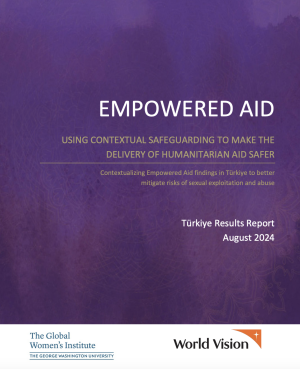
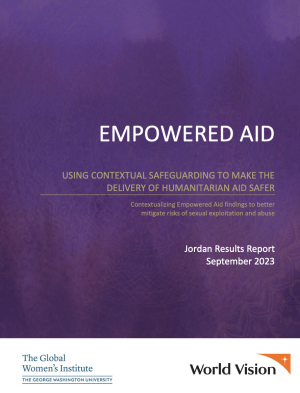
This report shares a summary of findings from applying the Empowered Aid approach with Syrian refugees living in Al Azraq camp in Jordan. This report represents findings from implementing the “Contextualization toolkit” developed by GWI to support aid actors in applying the results of Empowered Aid’s participatory action research to their humanitarian programming. It also captures findings from the administration of monitoring tools to capture feelings of safety and risk throughout the distribution process as implemented by World Vision Syria Response in Jordan. This report is also available in Arabic.
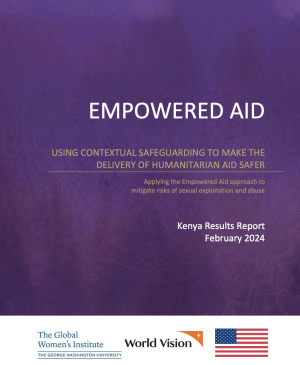
This report represents findings from implementing the Empowered Aid Contextualization Toolkit developed by GWI to support aid actors in applying the results of Empowered Aid’s participatory action research to their humanitarian programming. This report also captures findings from the administration of monitoring tools to capture feelings of safety and risk throughout the distribution process as implemented by World Vision Kenya in partnership with the Global Women’s Institute at the George Washington University. The findings of this report represents the collective expertise of the women and girls living in Kakuma and Dadaab camps who participated in the contextualization of the findings of Empowered Aid in Kenya.
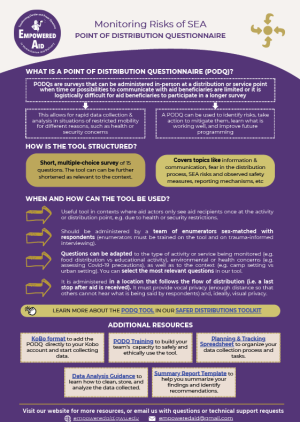
Monitoring and Evaluation Tip Sheets
Empowered Aid Monitoring and Evaluation Tip Sheets serve as preliminary guides for those who are interested in learning more about the tools used in the Empowered Aid Toolkit for Planning and Monitoring Safer Aid Distributions. Empowered Aid has Tip Sheets available for our Household Survey, Safety Audit, Focus Group Discussion, and Point of Distribution Questionnaire tools. The Tip Sheets are also available in Arabic, Spanish, and French.
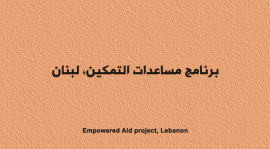
Empowered Aid Animated Video of the Phase 2 Pilot Findings to Mitigate SEA in Lebanon
The Empowered Aid Lebanon team in CARE International in Lebanon with the support of the GWI team developed an animated video to summarize the findings of the Phase II aid distribution pilots implemented in partnership with Union of Relief & Development Associations (URDA) in Lebanon. The animated video is an example of how to communicate back findings visually and creatively with women, girls, and affected communities, in which literacy may be a barrier.
Video Citation: Karim Koleilat, Independent animator, and CARE International in Lebanon. Beirut: Lebanon.
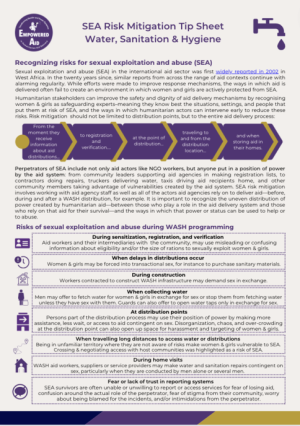
Empowered Aid Sector Tip Sheets
Empowered Aid Sector Tip Sheets serve as concise guides for those interested in mitigating sexual exploitation and abuse (SEA) in humanitarian settings by outlining sector-specific indicators and risk factors of SEA, and subsequently providing sector-specific recommendations to mitigate risks of SEA. Empowered Aid currently offers Tip Sheets for Food, Shelter, Cash, Fuel & Firewood, and WASH sectors, and each sector sheet is available in English, Spanish, French, and Arabic.
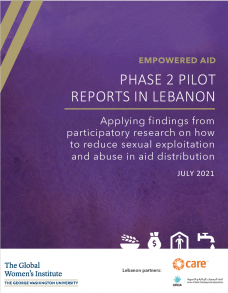
Phase 2 Pilot Reports in Lebanon
This booklet shares the reports from the two pilots conducted in Lebanon – a fuel voucher distribution and a food distribution – to test recommendations made by women and girls that could increase their safety at aid distributions. The booklet contains the summary report for each pilot as well as individual reports for each of the tools used during the distribution. This booklet is also available in French.
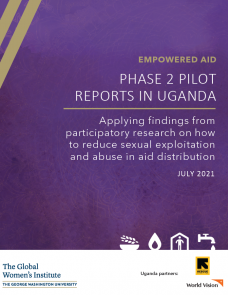
Phase 2 Pilot Reports in Uganda
This booklet shares the reports from the four pilots conducted in Uganda – the first food distribution, dignity kit distribution, the second food distribution, and a solar lamp distribution – to test recommendations made by women and girls that could increase their safety at aid distributions. The booklet contains the summary report for each pilot as well as individual reports for each of the tools used during the distribution. This booklet is also available in French and Spanish.
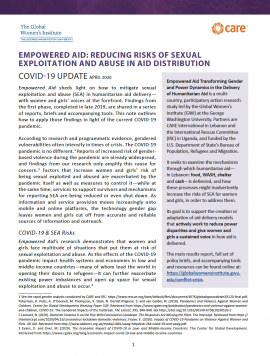
This brief summarizes recommendations to prevent and respond to SEA in the context of COVID-19.
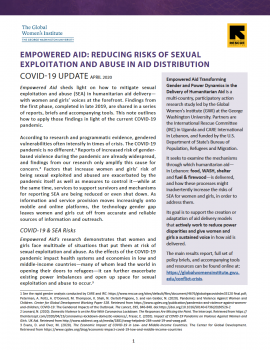
This brief summarizes recommendations to prevent and respond to SEA in the context of COVID-19.
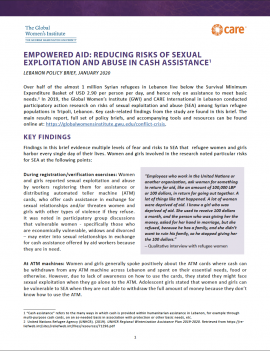
Empowered Aid Lebanon sector brief: SEA in relation to Cash Assistance
This brief summarizes key findings around SEA in relation to cash assistance and provides targeted recommendations to make cash assistance safer for women and girls. This brief is also available in Arabic.
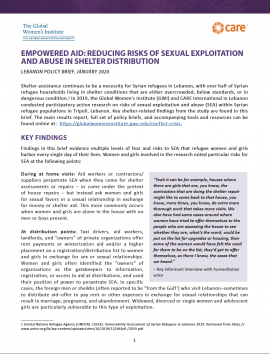
Empowered Aid Lebanon sector brief: SEA in relation to Shelter Assistance
This brief summarizes key findings around SEA in relation to shelter aid, and provides targeted recommendations to make shelter-related distributions safer for women and girls. This brief is also available in Arabic.
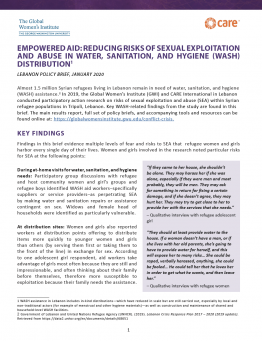
Empowered Aid Lebanon sector brief: SEA in relation to WASH Assistance
This brief summarizes key findings around SEA in relation to WASH and provides targeted recommendations to make WASH assistance safer for women and girls.
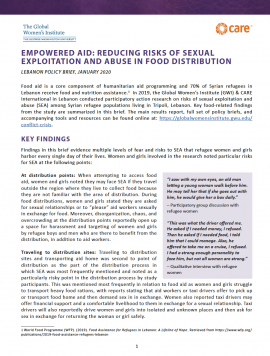
Empowered Aid Lebanon sector brief: SEA in relation to Food Aid
This brief summarizes key findings around SEA in relation to food distribution and provides targeted recommendations to make food distribution safer for women and girls. This is also available in Arabic.

This brief shares findings from the first phase of Empowered Aid in Lebanon around risks of sexual exploitation and abuse in relation to food, WASH, shelter, and cash assistance, throughout the distribution process. It is based on rigorous, longitudinal qualitative research with women and girls living in an urban refugee context in Tripoli, Lebanon. It provides targeted, action-oriented recommendations to make aid distributions safer for women and girls, grounded in their own voices. This brief is also available in Arabic.
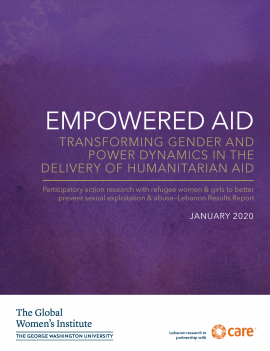
This report shares findings from the first phase of Empowered Aid in Lebanon around risks of sexual exploitation and abuse in relation to food, WASH, shelter, and cash assistance, throughout the distribution process. It is based on rigorous, longitudinal qualitative research with women and girls living in an urban refugee context in Tripoli, Lebanon. The report also summarizes findings related to other types of distribution-related gender-based violence. It provides targeted, action-oriented recommendations to make aid distributions safer for women and girls, grounded in their own voices.
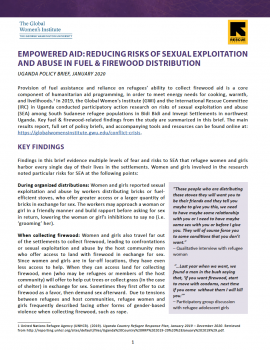
Empowered Aid Uganda sector brief: SEA in relation to Fuel and Firewood Assistance
This brief summarizes key findings around SEA in relation to fuel and firewood and provides targeted recommendations to make fuel and firewood assistance safer for women and girls.
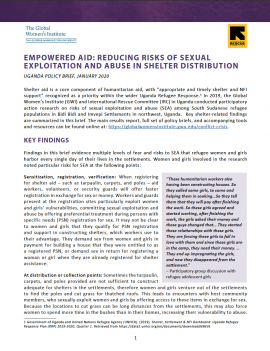
Empowered Aid Uganda sector brief: SEA in relation to Shelter Assistance
This brief summarizes key findings around SEA in relation to shelter aid and provides targeted recommendations to make shelter-related distributions safer for women and girls.
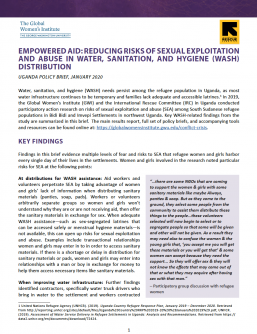
Empowered Aid Uganda sector brief: SEA in relation to WASH Assistance
This brief summarizes key findings around SEA in relation to WASH and provides targeted recommendations to make WASH assistance safer for women and girls.

Empowered Aid Uganda sector brief: SEA in relation to Food Aid
This brief summarizes key findings around SEA in relation to food distribution and provides targeted recommendations to make food distribution safer for women and girls.
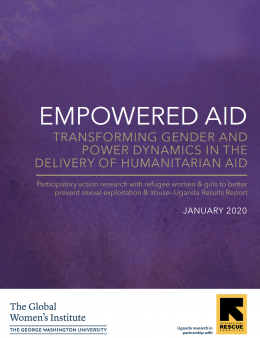
This report shares findings from the first phase of Empowered Aid in Uganda around risks of sexual exploitation and abuse in relation to food, WASH, shelter, and fuel and firewood, throughout the distribution process. It is based on rigorous, longitudinal qualitative research with women and girls living in Bidi Bidi and Imvepi refugee settlements in Uganda. The report also summarizes findings related to other types of distribution-related gender-based violence. It provides targeted, action-oriented recommendations to make aid distributions safer for women and girls, grounded in their own voices

This brief shares findings from the first phase of Empowered Aid in Uganda around risks of sexual exploitation and abuse in relation to food, WASH, shelter, and fuel and firewood, throughout the distribution process. It is based on rigorous, longitudinal qualitative research with women and girls living in Bidi Bidi and Imvepi refugee settlements in Uganda. It provides targeted, action-oriented recommendations to make aid distributions safer for women and girls, grounded in their own voices.

